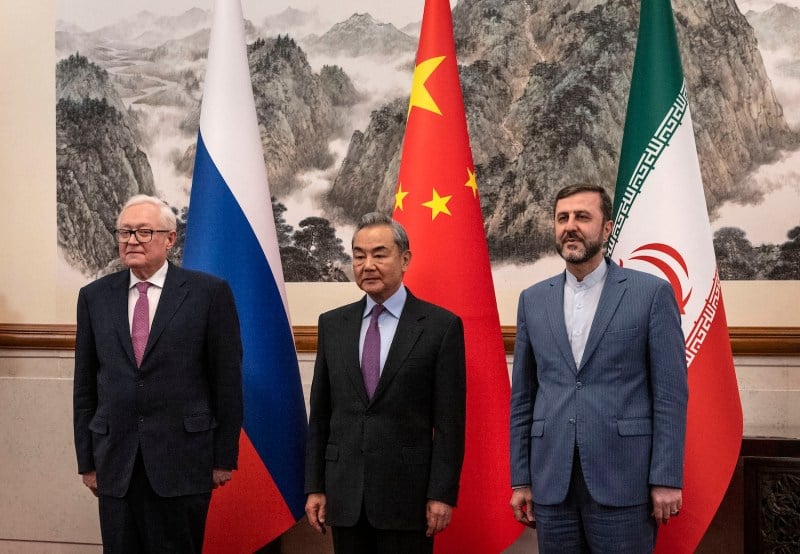What China Wants From Iran Nuclear Talks

What China Wants From Iran Nuclear Talks
Beijing is partners with Tehran but fears the nuclear crisis could be reaching a “critical juncture.”
Chinese Foreign Minister Wang Yi, center, meets with Russian Deputy Foreign Minister Sergey Ryabkov, left, and Iranian Deputy Foreign Minister Kazeem Gharibabadi before a meeting regarding the Iranian nuclear issue at the Diaoyutai State Guesthouse in Beijing on March 14. POOL/AFP via Getty Images
As concerns rise over Iran’s nuclear program, U.S. President Donald Trump is lobbying to get Tehran back to the negotiating table. He said as much in a letter sent to Iranian Supreme Leader Ayatollah Ali Khamenei last week via diplomats from the United Arab Emirates.
Khamenei immediately rejected the overture. “When we know they won’t honor it, what’s the point of negotiating?” he said during a meeting with university students on Wednesday. He also reiterated the country’s official position that it does not seek to build a nuclear weapon. “If we wanted to build nuclear weapons, the U.S. would not be able to stop it. We ourselves do not want it,” Khamenei said.
As concerns rise over Iran’s nuclear program, U.S. President Donald Trump is lobbying to get Tehran back to the negotiating table. He said as much in a letter sent to Iranian Supreme Leader Ayatollah Ali Khamenei last week via diplomats from the United Arab Emirates.
Khamenei immediately rejected the overture. “When we know they won’t honor it, what’s the point of negotiating?” he said during a meeting with university students on Wednesday. He also reiterated the country’s official position that it does not seek to build a nuclear weapon. “If we wanted to build nuclear weapons, the U.S. would not be able to stop it. We ourselves do not want it,” Khamenei said.
Tehran did say yes, though, to a trilateral meeting with Russia and China held in Beijing on Friday to discuss the issue.
At the meeting, the three countries’ deputy foreign ministers showed a united front. In a joint statement issued Friday, they called for “abandoning sanction, pressure, or threat of force” and reiterated their commitment to nonproliferation. Separately, Chinese Foreign Minister Wang Yi met with the Iranian and Russian officials and proposed a five-point plan, which largely echoed the joint statement but also called for the 2015 Iran nuclear deal, known as the Joint Comprehensive Plan of Action (JCPOA), to be the basis for future negotiations.
China is engaging in this diplomatic effort against a perilous backdrop. In February, the International Atomic Energy Agency reported that Iran had enriched more than 600 pounds of uranium up to 60 percent. Experts say the country could reach the 90 percent weapons-grade enrichment threshold within a matter of weeks.
That advancement, combined with the recent weakening of Iran, has reportedly led U.S. intelligence to conclude that Israel is considering launching major strikes on Iran in the next year. Israel would almost certainly seek Washington’s backing, and perhaps even U.S. military support, for such attacks. In an interview with Fox host Maria Bartiromo that aired on Sunday, Trump said, “I’ve written [the Iranians] a letter saying, ‘I hope you’re going to negotiate because if we have to go in militarily, it’s going to be a terrible thing.’”
All of this has Beijing concerned. “I think China sees the Iranian nuclear crisis approaching a critical juncture,” said Tong Zhao, a senior fellow at the Carnegie Endowment for International Peace’s Nuclear Policy Program.
China and Russia have a history of involvement in diplomacy on Iran’s nuclear program. Both countries were among the negotiators for the JCPOA, which Trump walked away from in 2018 in favor of a “maximum pressure” policy aimed at pushing Iran to agree to a more restrictive deal. That effort failed.
Now as Trump looks to renew talks, Beijing and Moscow each have their own interests in coming to the table again.
In the upside-down world of today’s U.S. foreign policy, Trump has turned to Russia to help defuse the Iran nuclear buildup. In a February call, Trump reportedly asked Russian President Vladimir Putin to mediate talks. For Russia, diplomatic overtures on Iran could help build more bonhomie with Trump. However, Russia’s economic and military support for Iran make it an unconventional choice to mediate a new deal, as Jonathan Lord, director of the Middle East Security Program at the Center for a New American Security, wrote in Foreign Policy this week.
For Beijing, there are also several reasons driving its diplomacy. After brokering a détente between Saudi Arabia and Iran in 2023, China is looking for further opportunities to project an image of itself as a responsible great power. “Beijing does not want to appear that it is being left out by Russia and the United States, because it was already left out in terms of the Ukraine discussion. So I think they have made quite an effort to reassert their role in international affairs,” said Yun Sun, director of the China program at the Stimson Center.
China also has an economic stake in the issue. Iran is a significant source of oil for China—it imports some 15 percent of its supply from Iran, despite Western sanctions on Tehran. “The potential risk of a military conflict over the Iranian nuclear crisis could introduce so much regional instability and chaos that could further disrupt China’s geo-economic and geopolitical interests,” Zhao said.
Importantly, even though Iran is a partner, China doesn’t support the country developing a nuclear weapon. “China doesn’t want to see another nuclear-armed state, which could lead to the domino effect of pushing more countries to pursue indigenous nuclear capabilities, especially as China perceives itself as a future leader at the global level,” Zhao said. “More nuclear confrontation among more nuclear-armed countries is not necessarily good news for any future leader of the international system.”
However, China’s long-held position on nonproliferation could shift with the changing geopolitical winds, experts said. Trump has urged Washington’s allies to be less reliant on the U.S. military and to take a much more active role in defending themselves. As a result, conversation in countries including South Korea has been building about whether they can continue to trust the U.S. nuclear umbrella or if they should instead invest in their own nuclear weapons. As those trends become clearer, they could also influence China’s position in negotiations over Iran, Zhao said.
Experts said the Friday meeting was an initial effort for the countries to coordinate their positions and far from a substantial restart of negotiations. It’s unclear what kind of conditions Trump would be amenable to since he rejected the 2015 deal.
But the three countries’ coordination is a reminder for Trump that even as he draws Russia closer, the United States is confronting a more tightly linked group of authoritarian states: China, Iran, and Russia—as well as North Korea. Just this week, China, Iran, and Russia conducted their fifth annual naval exercises in the Gulf of Oman.
On Friday morning, U.S. Secretary of State Marco Rubio was scheduled to attend a session as part of the G-7 foreign ministers meeting in Canada to coordinate a response to those four authoritarian countries’ growing alignment. But so far, Trump seems more inclined to work with traditional U.S. adversaries such as Russia than allies on everything from the war in Ukraine to new Iran nuclear talks.
Lili Pike is a reporter at Foreign Policy. X: @lili_pike
More from Foreign Policy
-

A Ukrainian machine-gunner holds an American FIM-92 Stinger portable air defense missile system for the reconnaissance and destruction of Russian drones in Zaporizhzhia, Ukraine, on Dec. 2, 2024. How Trump Is Killing the U.S. Defense Industry
It turns out that abandoning allies and tossing out security guarantees is bad for business.
-

Ukrainian President Volodymyr Zelensky talks to a group of European leaders on the sidelines of a summit in Kyiv on Feb. 24, the third anniversary of Russia’s full-scale invasion of Ukraine. Europe Is Now Led by Its North
The Nordics and Baltics are together inspiring visions of a stronger continent.
-

Trump stands at a podium with both arms outstretched and his hands open as he speaks. He wears a dark suit and a bright red tie. Trump Is Trying to Remake the United Nations
Washington has signaled that it wants the international body to focus on preserving peace, but it could be looking to rubber-stamp its bilateral priorities.
-

Donald Trump speaks during a campaign rally at Van Andel Arena on November 5, 2024 in Grand Rapids, Michigan. Trump’s Concert of Kingpins Won’t Work
A globe carved up by strongmen isn’t any world order at all.








Join the Conversation
Commenting on this and other recent articles is just one benefit of a Foreign Policy subscription.
Already a subscriber?
.
Subscribe
Subscribe
View Comments
Join the Conversation
Join the conversation on this and other recent Foreign Policy articles when you subscribe now.
Subscribe
Subscribe
Not your account?
View Comments
Join the Conversation
Please follow our comment guidelines, stay on topic, and be civil, courteous, and respectful of others’ beliefs.
Change your username |
Log out
Change your username:
CANCEL
Confirm your username to get started.
The default username below has been generated using the first name and last initial on your FP subscriber account. Usernames may be updated at any time and must not contain inappropriate or offensive language.